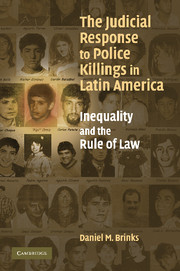Book contents
- Frontmatter
- Contents
- Preface
- 1 Effectiveness and Inequality in the Legal System
- 2 Charting Injustice in Argentina, Brazil, and Uruguay
- 3 Informational and Normative Shifts Across Jurisdictions
- 4 Buenos Aires – Political Interference and Informational Dependence
- 5 São Paulo – Normative Autonomy and Informational Failures
- 6 Uruguay – Strong Results from a Weak System
- 7 Córdoba – High Levels of Inequality in a Strong System
- 8 Salvador da Bahia – Social Cleansing Under Political and Judicial Indifference
- 9 Binding Leviathan
- Appendix: Methods, Case Selection, and Sampling
- References
- Index
6 - Uruguay – Strong Results from a Weak System
Published online by Cambridge University Press: 07 September 2009
- Frontmatter
- Contents
- Preface
- 1 Effectiveness and Inequality in the Legal System
- 2 Charting Injustice in Argentina, Brazil, and Uruguay
- 3 Informational and Normative Shifts Across Jurisdictions
- 4 Buenos Aires – Political Interference and Informational Dependence
- 5 São Paulo – Normative Autonomy and Informational Failures
- 6 Uruguay – Strong Results from a Weak System
- 7 Córdoba – High Levels of Inequality in a Strong System
- 8 Salvador da Bahia – Social Cleansing Under Political and Judicial Indifference
- 9 Binding Leviathan
- Appendix: Methods, Case Selection, and Sampling
- References
- Index
Summary
We cannot defend our democracies if we abandon respect for due process. When a society puts security before human rights, or when public order is put over and above the civil liberties of citizens, then that democracy has adopted the tactics and principles – or lack of principles – of its enemies, and has been partially defeated.
Statement attributed to Sophia Macher, of the Peruvian Truth and Reconciliation Commission, in an April 2005 Brief to the Canadian House of Commons by the International Civil Liberties Monitoring GroupUruguay has not yet put security above civil liberties. The case of Uruguay gives us considerable leverage in searching for an explanation for judicial effectiveness, since it gives us cross-system variation to expand the within-system variation I have been exploring in places like Buenos Aires and São Paulo. In sharp contrast to Brazil and Argentina, Uruguay actually protects the victims of police violence. It also varies from these other jurisdictions on a number of potential explanatory variables. Whereas São Paulo presented a case of strong institutions and weak results, Uruguay shows strong results with quite weak institutions. The answer to this paradox lies in the context in which these institutions are embedded: a more congenial political atmosphere creates incentives for judges and prosecutors to be proactive in these cases; and a less marginalized victim population allows these judicial actors to penetrate the veil of darkness that typically surrounds these cases in Brazil and Argentina.
- Type
- Chapter
- Information
- The Judicial Response to Police Killings in Latin AmericaInequality and the Rule of Law, pp. 178 - 204Publisher: Cambridge University PressPrint publication year: 2007



